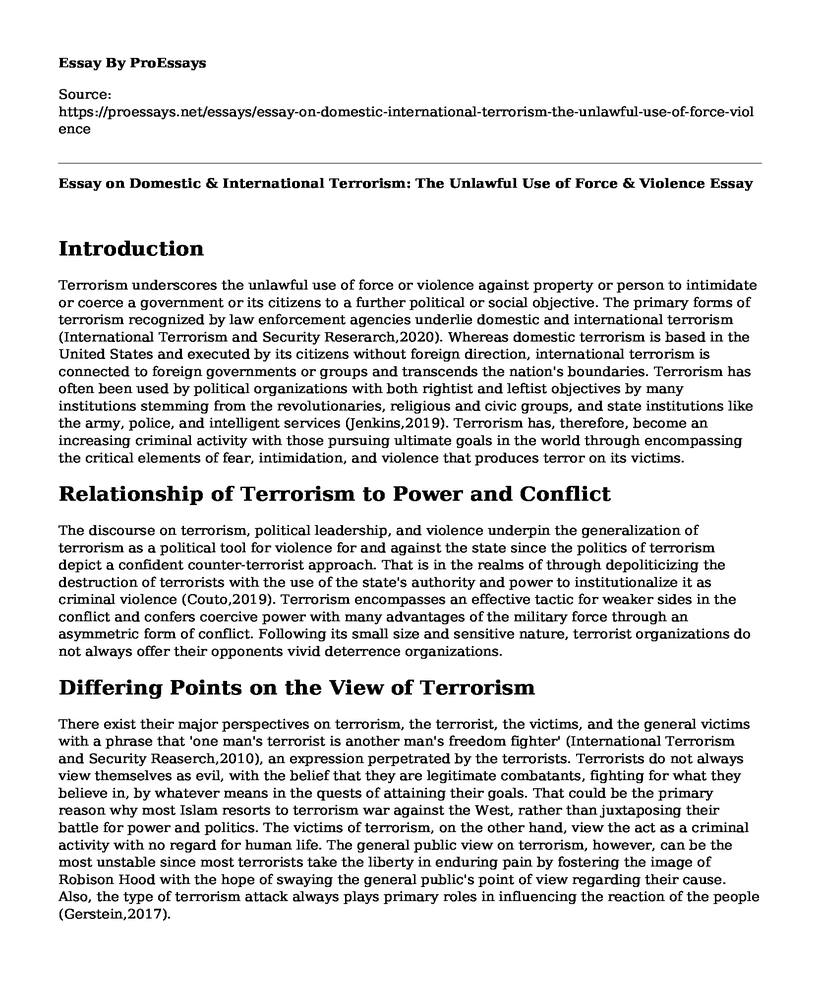Introduction
Terrorism underscores the unlawful use of force or violence against property or person to intimidate or coerce a government or its citizens to a further political or social objective. The primary forms of terrorism recognized by law enforcement agencies underlie domestic and international terrorism (International Terrorism and Security Reserarch,2020). Whereas domestic terrorism is based in the United States and executed by its citizens without foreign direction, international terrorism is connected to foreign governments or groups and transcends the nation's boundaries. Terrorism has often been used by political organizations with both rightist and leftist objectives by many institutions stemming from the revolutionaries, religious and civic groups, and state institutions like the army, police, and intelligent services (Jenkins,2019). Terrorism has, therefore, become an increasing criminal activity with those pursuing ultimate goals in the world through encompassing the critical elements of fear, intimidation, and violence that produces terror on its victims.
Relationship of Terrorism to Power and Conflict
The discourse on terrorism, political leadership, and violence underpin the generalization of terrorism as a political tool for violence for and against the state since the politics of terrorism depict a confident counter-terrorist approach. That is in the realms of through depoliticizing the destruction of terrorists with the use of the state's authority and power to institutionalize it as criminal violence (Couto,2019). Terrorism encompasses an effective tactic for weaker sides in the conflict and confers coercive power with many advantages of the military force through an asymmetric form of conflict. Following its small size and sensitive nature, terrorist organizations do not always offer their opponents vivid deterrence organizations.
Differing Points on the View of Terrorism
There exist their major perspectives on terrorism, the terrorist, the victims, and the general victims with a phrase that 'one man's terrorist is another man's freedom fighter' (International Terrorism and Security Reaserch,2010), an expression perpetrated by the terrorists. Terrorists do not always view themselves as evil, with the belief that they are legitimate combatants, fighting for what they believe in, by whatever means in the quests of attaining their goals. That could be the primary reason why most Islam resorts to terrorism war against the West, rather than juxtaposing their battle for power and politics. The victims of terrorism, on the other hand, view the act as a criminal activity with no regard for human life. The general public view on terrorism, however, can be the most unstable since most terrorists take the liberty in enduring pain by fostering the image of Robison Hood with the hope of swaying the general public's point of view regarding their cause. Also, the type of terrorism attack always plays primary roles in influencing the reaction of the people (Gerstein,2017).
The terrorists have always juxtaposed that sympathetic view to sway the public to justify their actions as a vital part of their psychological welfare. However, such views have always been countered by the media, government, and other organizations. Similarly, the differing views on terrorism underscore the support of an aggressive government by the public in pursuance of terrorism and terrorist threats at the same time there exists sharp divides ion partisan lines on intruding and infringing on personal privacy on fellow citizens, and the legitimacy of doing so. There exists, therefore, the controversial issue of protecting the country versus infringing on one's privacy as some people are in support of antiterrorism policies at the expense of personal privacy while others are against them, citing the compromising of individuals' privacy rights through spying programs.
Conclusion
Terrorism underlies the unlawful violence against property and people to coerce the citizens or a government to compromise particular political or social objectives. The significant types of terrorism are domestic and international terrorism, with the former being based within the country and done by its citizens with no different directions as the latter transcends the boundaries of the nation. Terrorism confers coercive power to its advantages through various forms of conflict as the opponents may never accomplish deterrence. Finally, the three significant views of terrorism underscore the terrorists who feel that they are very right and that their actions are justified. The victims, on the other hand, view that act as criminal and human activities and the general public whose views may be unstable depending on the context of the terrorist movement.
References
Couto, R. (2019). The Politics of Terrorism: Power, Legitimacy, and Violence. Integral Review.Retrieved from http://integralreview.org/documents/Couto,%20Politics%20of%20Terrorism,%20Vol.%206%20No.201.pdf
Gerstein, D. (2017). Two Very Different Views of Terrorism and What to do About Them. RandCorporation. Retrieved from https://www.rand.org/blog/2017/04/two-very-differentviewsof-terrorism-and-what-to-do.html
International Terrorism and Security Research. (2020). What is Terrorism? Terrorism Research.Retrieved from http://www.terrorism-research.com/
Jenkins, J. (2019). Terrorism. Encyclopedia Britannica. Retrieved fromhttps://www.britannica.com/topic/terrorism
Cite this page
Essay on Domestic & International Terrorism: The Unlawful Use of Force & Violence. (2023, May 30). Retrieved from https://proessays.net/essays/essay-on-domestic-international-terrorism-the-unlawful-use-of-force-violence
If you are the original author of this essay and no longer wish to have it published on the ProEssays website, please click below to request its removal:
- Essay Sample on Cyber Bullying
- Deconstructing Gender Essay Example
- Essay Sample on Role of Nigerian Women Play in Politics
- Essay Sample on Supreme Court Rules on Geolocation Warrants: Carpenter v. United States
- Article Analysis Essay on "She Didn't Act Like a Rape Victim"
- Prison Standards Transformed: From Congestion and Torture to Rights and Freedoms - Essay Sample
- Planned Parenthood of Southeast Pennsylvania v Casey







